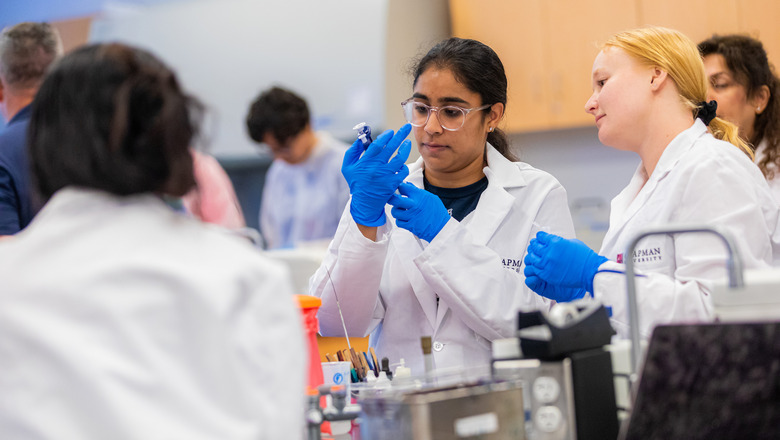 Pharmacists prepare and dispense medication, ensure medicines and doses are correct,
prevent harmful drug interactions, collaborate with other health care professionals,
counsel patients on the safe and appropriate use of their medications, conduct health
and wellness screenings, provide immunizations, and manage pharmacy systems.
Pharmacists prepare and dispense medication, ensure medicines and doses are correct,
prevent harmful drug interactions, collaborate with other health care professionals,
counsel patients on the safe and appropriate use of their medications, conduct health
and wellness screenings, provide immunizations, and manage pharmacy systems.
A GPA of 3.4 or higher is ideal as a competitive applicant. In addition, you should cultivate a variety of experiences that make you a strong candidate:
- Volunteer or paid experience working with patients in a pharmacy or healthcare setting (hospital, nursing home, etc.)
- Community service and involvement
- Research, extracurricular, and work/life experiences
All of these things demonstrate your readiness and motivation to pursue a career in pharmacy.
Activities and extracurriculars
Get involved early in these and ramp up to have a well-rounded resume by the time you apply. However, your first job is your academics. You need to maintain a strong academic foundation to be competitive.
- Clinical involvement. You can gain experience and learn about the field in a number of ways:
- Shadowing a pharmacist and/or working in a pharmacy. What do they do that appeals to you?
- Volunteering in free clinics, hospitals, nursing homes, stand-alone pharmacies—learn about the field.
- Shadow other healthcare providers. How can these different professions be complementary? How do they work together? What are the differences in their roles?
- Community service. Give of yourself to your community. Shelters, food banks, community resource centers, after school programs. Preferably not clinically related, although in some cases there may be some crossover.
- Research. Chapman offers many opportunities for students to get involved in research as an undergrad.
- Extracurriculars. Involvement in things you’re interested in, including clubs; does not need to be clinically related.
Academics/prerequisites
These are the general courses you should take. There may be some programs that have additional or fewer requirements. Always check with the programs to confirm.
|
Required subjects |
Course options |
|---|---|
|
Biochemistry (1 semester) |
BCHM 335 (BioChem) |
|
Biology (2 semesters with labs) |
• BIOL 204 Biology AP credit generally not accepted |
|
Calculus (1 semester) |
MATH 110 or MATH 111 (or AP credit) |
|
Human Anatomy (1 semester with lab) |
HSCI/BIOL 210 |
|
Human Physiology (2 semesters with labs) |
• HSCI 365 |
|
Microbiology (1 semester) |
BIOL 317 |
|
English Composition (1-2 semesters) |
• ENG 103 |
|
General/Inorganic Chemistry (2 semesters with labs) |
• CHEM 140 and CHEM 140L Chemistry AP credit generally not accepted |
|
Organic Chemistry (2 semesters with lab) |
• CHEM 230 and 230L |
|
Physics (2 semesters with labs) |
PHYS 101 and PHYS 102 or PHYS 107 and PHYS 108 |
|
Psychology (1 semester) |
PSY 101 |
|
Statistics (1 semester) |
Most stats courses; options include MATH 203, PSYC 203, MATH 303 (or AP credit) |
